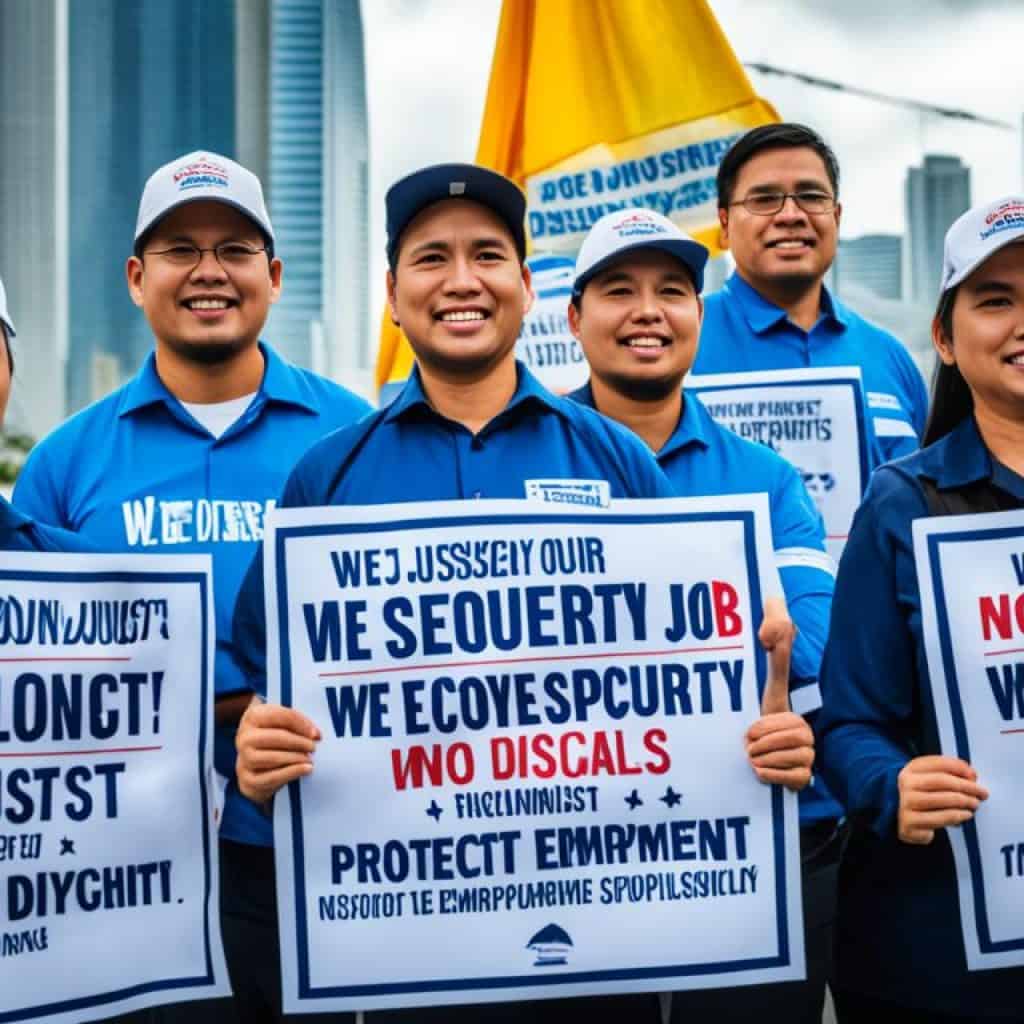Have you ever wondered how labor laws in the Philippines differ from those in other countries? What are the rights and protections afforded to employees in the Philippines? As employers and employees navigate the complex landscape of labor regulations, it is crucial to understand the Philippine Labor Code and the unique aspects of employee rights in this country.
In this article, we will delve into the intricacies of labor laws in the Philippines and shed light on various important aspects such as leave benefits, social security, and overtime pay requirements. We will explore the different types of employment recognized by the Labor Code of the Philippines and the rights employees have in each category. Additionally, we will discuss the implications and penalties of employee misclassification and the legal enforceability of non-disclosure agreements.
Are you ready to unravel the complexities of labor laws in the Philippines? Let’s dive in and discover the key essentials that both employers and employees need to know in order to navigate the labor landscape effectively and ensure compliance with Philippine labor regulations.
Key Takeaways:
- Philippine labor laws have unique provisions regarding leave benefits, social security, and overtime pay requirements.
- The Labor Code of the Philippines recognizes six types of employment, each with its own characteristics and implications.
- Employment in the Philippines is not at-will, and due process must be followed before dismissing an employee.
- Misclassifying employees can lead to penalties and legal consequences for employers.
- Non-disclosure agreements are legally binding in the Philippines, as long as they comply with other laws and are not used to cover up criminal behavior.
Types of Employment in the Philippines
The Labor Code of the Philippines, managed by the Department of Labor and Employment (DOLE), provides a framework for different types of employment in the country. Understanding these employment classifications is essential for both employers and employees to navigate labor regulations effectively.
1. Regular Employment
In regular employment, employees are hired for an indefinite period and enjoy the full benefits and protections mandated by law, such as paid leave, social security, and retirement benefits.
2. Probationary Employment
Probationary employment allows employers to assess an employee’s suitability for a particular position or job. During this period, which should not exceed six months, employers can evaluate an employee’s performance before deciding whether to extend a permanent employment contract.
3. Fixed-Term Employment
Fixed-term employment refers to a specific employment period defined by a predetermined start and end date. This type of employment is commonly used for project-based work or temporary staffing needs.
4. Seasonal Employment
Seasonal employment is characterized by employees working only during specific seasons or peak periods. Industries such as tourism and agriculture often employ seasonal workers to meet fluctuating demand.
5. Project Employment
Project employment is similar to fixed-term employment, but it is specifically tied to a particular project with a defined scope and timeline. Individuals hired for project employment are typically assigned to a specific project and their employment ends upon completion.
6. Casual Employment
Casual employment refers to irregular or intermittent work arrangements, often on a daily or hourly basis. Casual employees receive higher hourly wages but do not enjoy the same benefits and security as regular employees.
It is crucial for employers to correctly classify employees based on the nature of their employment to ensure compliance with the Labor Code of the Philippines. Misclassification can lead to legal consequences, including penalties and employee claims for benefits. Employees should also be aware of their rights and entitlements based on their employment classification.
Employment Security in the Philippines
One of the fundamental rights employees have in the Philippines is the right to security of tenure. This means that employers cannot terminate employees without valid reasons. The Labor Code of the Philippines specifies two types of causes for dismissal: just cause and authorized cause.
Just cause refers to employee wrongdoing or misconduct. Examples of just cause include gross negligence, habitual tardiness, unethical behavior, and insubordination. Employers must gather sufficient evidence and follow proper procedures when dismissing employees for just cause.
Authorized cause pertains to grounds that are beyond an employee’s control, such as redundancy, retrenchment, or the closure of a business. Employers must provide notices and compensation to affected employees in these situations. This ensures that employees are not unfairly disadvantaged due to circumstances beyond their control.
In both cases, due process must be followed before an employee can be officially dismissed. This process includes providing written notices to the employee, allowing them the opportunity to respond or defend themselves, and conducting hearings when necessary. It ensures that employees are treated fairly and that their side of the story is heard.
“The right to security of tenure protects employees from arbitrary termination and provides them with stability and confidence in their employment. It guarantees that employees will not be dismissed without justifiable reasons and safeguards their livelihoods.”
Employment security is crucial for maintaining a harmonious and productive work environment. It allows employees to focus on their roles without the fear of sudden job loss. At the same time, it encourages employers to make well-considered decisions when it comes to dismissal, promoting fairness and accountability in the workplace.
By upholding the right to security of tenure, the Philippines aims to protect employees and maintain the integrity of the labor market. It ensures that employees are not subject to arbitrary termination and provides them with a sense of stability and confidence in their employment.
Why Employment Security Matters?
Employment security has several benefits for both employers and employees:
- Greater employee loyalty and commitment, leading to higher productivity and job satisfaction.
- Reduced turnover rates, resulting in cost savings for recruitment and training.
- Ensured fairness and accountability in employment practices.
- Enhanced employee morale and well-being.
By prioritizing employment security, employers can foster a positive work environment that values and respects its employees. This contributes to the overall success and growth of the organization.
As employers, it is important to familiarize yourself with the just causes and authorized causes for dismissal outlined in the Labor Code of the Philippines. By doing so, you can ensure that you adhere to the proper procedures and protect the rights of your employees.

Employee Misclassification in the Philippines
Employee misclassification can result in significant legal repercussions for employers in the Philippines. Misclassifying employees as independent contractors can lead to penalties, including back pay, benefits reimbursement, court-ordered damages, and even potential jail time. Understanding the distinction between contractors and employees is crucial for employers to avoid these penalties.
Employees in the Philippines work exclusively under the direct supervision of an employer for an indefinite time period. They are entitled to various employee benefits, such as paid leave, social security contributions, and health insurance coverage. On the other hand, contractors are considered self-employed and work autonomously for a fixed time period or duration of a specific project. They do not receive employee benefits and have greater flexibility in their working arrangements.
Correctly classifying workers is essential to comply with labor regulations and avoid legal consequences. Employers should carefully evaluate the nature of the work relationship, considering factors such as control, independence, and the economic reality of the situation. It is advisable to consult with legal professionals or labor experts to ensure accurate classification.
| Employee Classification | Key Characteristics |
|---|---|
| Employee |
|
| Contractor |
|
Properly classifying employees not only ensures compliance with labor laws but also promotes fair treatment and protection for workers. It is in the best interest of employers to accurately determine the employment status of their workers to create a harmonious and legally sound working environment.
Penalties for Misclassification
The penalties for employee misclassification can be severe. In addition to financial consequences such as back pay and benefits reimbursement, employers may face court-ordered damages. In some cases, intentional misclassification can even result in criminal liability, potentially leading to fines and imprisonment. It is essential for employers to prioritize proper classification to avoid these penalties.
Non-Disclosure Agreements in the Philippines
Non-disclosure agreements (NDAs) play a crucial role in protecting a company’s proprietary information in the Philippines. These agreements are legally binding, as long as they comply with other laws and are not used to cover up criminal behavior.
An NDA is a legal contract that establishes a confidential relationship between the parties involved and outlines the terms of confidentiality. It must clearly indicate the confidential information that is being protected, the parties bound by the agreement, and the specific terms governing its confidentiality.
NDAs are particularly important in employment contracts, where a confidentiality clause can be included to safeguard sensitive information. This clause ensures that employees are aware of their obligations to maintain confidentiality and can be held accountable for any breaches.
“A well-drafted non-disclosure agreement can provide businesses with the necessary legal recourse if their proprietary information is wrongfully disclosed or used by others.” – Legal Expert
By implementing NDAs in employment contracts, companies can establish a level of trust and protection for their trade secrets, client lists, marketing strategies, and other valuable information. This allows businesses to confidently share confidential information with their employees, knowing that they are legally bound to maintain its confidentiality.
Ultimately, non-disclosure agreements are a valuable tool for both employers and employees in the Philippines. They serve as a legal framework to ensure the protection of confidential information and can be used to prevent unauthorized disclosures that may have damaging consequences for businesses.
The Benefits of Non-Disclosure Agreements:
- Protection of proprietary information
- Evidence of the parties’ intent to maintain confidentiality
- Legal recourse in case of breaches
- Establishment of trust and confidence between employers and employees
In conclusion, non-disclosure agreements are an essential legal tool for businesses in the Philippines. By ensuring the confidentiality of sensitive information, NDAs help safeguard a company’s competitive advantage and maintain trust within the workforce.
13th Month Pay in the Philippines
Filipino employees are entitled to 13th month pay, which is an extra month’s salary given by employers. It is mandated by law and must be provided to non-management employees in the Philippines by Christmas Eve. This mandatory extra salary serves as a way to show appreciation and ensure that employees have a little extra financial support during the holiday season.
Some employers choose to provide the 13th month pay as a lump sum, while others may divide it into biannual installments. However, regardless of the payment structure, it is crucial for employers to follow the law and provide this additional compensation to eligible employees.
The Compliance Report
In order to ensure compliance with the law regarding the 13th month pay, employers in the Philippines are required to file a compliance report to the appropriate government agencies. This report serves as documentation that the mandated payment has been made to the employees. By filing this report, employers show that they are adhering to labor regulations and fulfilling their obligations to their workforce.
| Key Points on 13th Month Pay | |
|---|---|
| Eligibility | All non-management employees in the Philippines |
| Payment Deadline | Christmas Eve |
| Payment Structure | Lump sum or biannual installments |
| Compliance Report | Required for documentation and labor regulation adherence |
By providing the 13th month pay and submitting the compliance report, employers demonstrate their commitment to supporting their employees and complying with the labor laws of the Philippines. This mandatory extra salary serves as a way to promote employee satisfaction and financial well-being during the holiday season.

Workplace Health and Safety Standards in the Philippines
Ensuring workplace health and safety is a crucial responsibility for employers in the Philippines. The Department of Labor and Employment (DOLE) has established comprehensive Occupational Safety and Health Standards to safeguard the well-being of Filipino employees.
These standards encompass several essential aspects, including:
- The right to know about workplace hazards
- The right to refuse unsafe work
- The right to report accidents
- The requirement for employers to register their businesses with the DOLE
By providing employees with the right to understand potential hazards, refuse unsafe tasks, and report accidents, these standards prioritize their well-being and promote a safe work environment. Employers are obligated to register their businesses with the DOLE to ensure compliance with these standards.
Non-compliance with the Occupational Safety and Health Standards can lead to penalties and fines. It is imperative for employers to prioritize workplace health and safety by implementing appropriate measures, conducting regular inspections, and providing necessary safety training.
Promoting a Safe Work Environment
“A safe workplace is essential for the well-being and productivity of employees. By complying with the Occupational Safety and Health Standards, employers can create a culture of safety and protect their most valuable asset: their workforce.”
Implementing workplace health and safety measures not only safeguards employees’ physical well-being but also boosts morale and productivity. Employers who prioritize safety build trust and loyalty among their workforce, contributing to a positive work environment.
By adhering to the Occupational Safety and Health Standards set by the DOLE, employers demonstrate their commitment to the welfare of their employees. Through proper safety protocols, training, and risk assessment, workplaces can mitigate potential hazards and minimize accidents.
Table: Importance of Workplace Health and Safety
| Benefits for Employers | Benefits for Employees |
|---|---|
|
|
Prioritizing workplace health and safety not only protects individuals but also contributes to the overall success of businesses by fostering a secure and harmonious work environment.
Trade Unions and Collective Bargaining in the Philippines
Filipino employees have the right to join trade unions and engage in collective bargaining agreements to have a say in their conditions of employment. Trade unions play a significant role in representing the interests of workers and advocating for better working conditions and benefits.
Collective bargaining agreements (CBAs) are contracts negotiated between trade unions and employers. These agreements cover both economic and non-economic provisions that directly impact employees.
Benefits of Trade Unions
- Representation: Trade unions provide a collective voice to workers, ensuring that their concerns and demands are heard by employers.
- Negotiation Power: Through collective bargaining, unions can negotiate fair wages, benefits, and working conditions on behalf of their members.
- Job Security: Unions strive to protect job security and prevent wrongful terminations by advocating for due process and fair treatment.
- Training and Development: Trade unions often offer training programs and opportunities for skill enhancement to their members, promoting career growth.
Collective Bargaining Agreements
Collective bargaining agreements cover various aspects of employment. Here are some key provisions commonly included in CBAs:
- Wages and Benefits: CBAs negotiate fair compensation packages, including salaries, bonuses, allowances, healthcare benefits, retirement plans, and other monetary incentives.
- Working Hours and Overtime: CBAs establish rules regarding regular working hours, rest periods, breaks, and overtime pay rates.
- Workplace Policies: CBAs address workplace policies, such as disciplinary procedures, grievance handling, and conflict resolution mechanisms.
- Health and Safety: CBAs promote safe working environments by outlining health and safety standards, providing protective equipment, and ensuring compliance with relevant regulations.
- Leave Benefits: CBAs cover various types of leaves, including vacation leave, sick leave, maternity/paternity leave, and special leaves.
By participating in trade unions and engaging in collective bargaining, employees in the Philippines can have a collective voice, better work conditions, and improved job security.

| Benefits of Trade Unions | Key Provisions in Collective Bargaining Agreements |
|---|---|
|
|
Minimum Wage in the Philippines
When it comes to determining the minimum wage in the Philippines, there is no one-size-fits-all approach. Instead, wage boards are responsible for setting different rates that vary across regions. The Department of Labor and Employment (DOLE) oversees these wage boards to ensure fair wages for workers across the country.
Minimum wage rates are periodically adjusted to keep up with economic changes and the cost of living. These rates differ depending on the type of industry and the region where employees work. Wage boards take into account factors such as industry profitability, prevailing market rates, and the capacity of employers to pay.
Employers must comply with the minimum wage requirements in their specific region to ensure that their employees are properly compensated for their work. Failure to pay the minimum wage can result in penalties and legal consequences.
Sample Minimum Wage Rates in Select Regions
| Region | Minimum Wage Rate |
|---|---|
| National Capital Region (NCR) | PHP 537 |
| Central Luzon | PHP 400 – PHP 485 |
| CALABARZON | PHP 404 – PHP 537 |
| Western Visayas | PHP 365 – PHP 395 |
Note: The above rates are sample figures and may not reflect the current minimum wage rates. Please refer to the official wage boards and the Department of Labor and Employment for the most up-to-date information.
It is important for employers to stay informed about the minimum wage rates in their respective regions to ensure compliance and fair treatment of their employees. By doing so, businesses can contribute to the economic well-being of their workers and create a more equitable society.
Overtime Laws in the Philippines
In the Philippines, the standard work week is 40 hours. Employees are entitled to extra compensation for additional working hours, with overtime pay of at least 25% of their regular wage. Overtime pay increases during holidays and scheduled rest days, and there is additional compensation for working night shifts. The labor laws in the Philippines aim to protect employees and compensate them for additional work hours.
Conclusion
Understanding labor laws in the Philippines is essential for both employers and employees to create a harmonious and legally compliant working environment. The labor regulations cover various aspects such as types of employment, employee security, misclassification penalties, non-disclosure agreements, extra pay requirements, workplace health and safety, trade unions, minimum wage, and overtime laws.
By familiarizing themselves with these labor standards, businesses can ensure compliance, protect employee rights, and maintain a fair and equitable workplace. Employers must adhere to the different types of employment classifications and follow due process when terminating employees. Misclassifying workers can lead to severe penalties, including back pay and legal repercussions.
Furthermore, non-disclosure agreements play a vital role in safeguarding a company’s confidential information. These agreements must comply with other laws and clearly define the parties involved and the terms of confidentiality. Employers are also legally obligated to provide 13th month pay to employees, enhancing their financial security.
Workplace health and safety standards are the responsibility of employers, and compliance with the Occupational Safety and Health Standards is crucial. Filipino employees have the right to join trade unions, enabling them to negotiate collective bargaining agreements that cover various aspects of their employment, including wages, benefits, and working conditions.
Lastly, employers must be aware of the minimum wage requirements in their specific regions and compensate employees fairly for overtime work. Understanding and adhering to these labor regulations not only ensure compliance with employment laws but also foster a positive work environment that promotes employee rights and well-being.


















Add comment